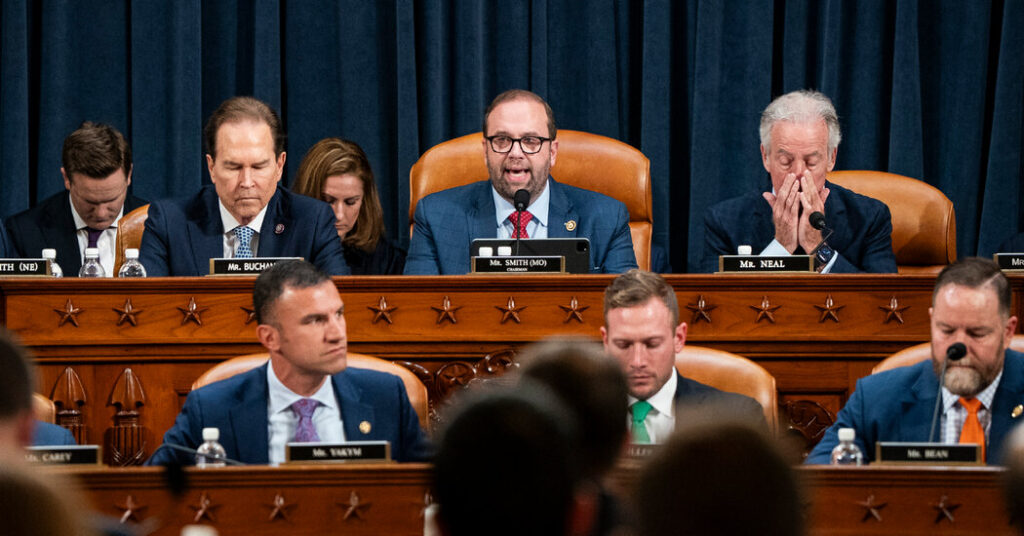It was Representative Blake Moore’s turn to vote, and the Utah Republican was asleep.
By the time the clerk called Mr. Moore’s name, at around 5 a.m. on Wednesday, the tax-writing House Ways and Means Committee, which is drafting the tax portion of what President Trump calls the “big, beautiful bill,” had been meeting for some 14 hours. The vote was on one of several amendments that Democrats were trying to make to the proposal.
When the clerk was met with silence, he tried again. “Mr. Moore?” Attention — and a C-SPAN camera — shifted toward the congressman’s chair, where he could be seen slumped forward, head listing toward one side. A colleague eventually jostled him awake, and he voted no.
Politicians generally try to keep their snoozing out of public view in the Capitol complex, where many are known to sleep in their offices or retreat to hideaways for private moments of rest.
But as Republicans rush this week to speed along a mega-bill to enact Mr. Trump’s domestic agenda, two committees overseeing some of the most contentious proposals held marathon meetings that turned into all-night affairs.
In another office building just down Capitol Hill, a camera caught Representative Debbie Dingell, Democrat of Michigan, with her eyes closed and her head tipped back as the House Energy and Commerce Committee debated Medicaid cuts during a 26-hour-plus meeting.
Ms. Dingell later suggested archly that she was just resting her eyes.
“Been up for 31 hours straight fighting Republicans trying to gut Medicaid,” she wrote in a reply on X to the video. “Closed my eyes to think about an America where everyone has access to quality, affordable health care.”
All-nighters are more typically seen as the province of Red Bull-fueled college students cramming for exams than of Congress, where the average member’s age is around 57 in the House and 64 in the Senate. But from time to time, for reasons of political expediency, legislative quirks or just plain old poor planning, lawmakers end up skipping bedtime.
It is rarely, strictly speaking, necessary. Lawmakers set their own schedule, usually flying home for long weekends in their districts. But today’s Congress seldom does anything without a deadline, so the Capitol Hill calendar is riddled with manufactured midnight due dates.
Arcane rules can also lead to graveyard shifts at the Capitol, such as when the Senate holds an all-night “vote-a-rama,” a marathon of rapid-fire votes on components of a budget resolution, which can have unlimited amendments.
This week, House Republicans found themselves with plenty of reasons to resort to all-night committee sessions. They faced tough votes on cuts to Medicaid and food assistance for the poor that many did not particularly relish casting in the light of day. And given that party divisions have already delayed their package and jeopardized their goal of completing the measure in time for a Memorial Day recess, they were also short on time.
Democrats on the Energy and Commerce Committee submitted scores of amendments as a way to force unpleasant votes on Medicaid. The panel did not start debating that section of the bill until well after midnight, relegating some of the trickiest votes to hours when the public would most likely not be paying attention.
Representative Frank Pallone Jr. of New Jersey, the top Democrat on the committee, tried to upend those plans by asking the panel to take an overnight break. His hope, he said, was that rather than discussing Medicaid cuts in the wee hours, lawmakers might talk about them “while people are awake and can tune in.”
The effort failed after Republicans unanimously opposed it.
Democrats played their own role in prolonging the session. As they were shut out of negotiations on the bill, the overnight meetings brought them their best chance to directly attack Republicans’ policies, propose alternatives and force uncomfortable votes that could later serve as fodder for campaign attacks.
The House Agriculture Committee, which is weighing the cuts to food assistance programs, opted against an overnight session, adjourning on Tuesday at 11 p.m. and reconvening Wednesday morning for a meeting that stretched all day and appeared to be headed for another late night.
Some lawmakers sought to wring political mileage out of the episode, wearing their drowsiness as a badge of honor that proved they were working hard for their constituents.
“While I’m tired, I am also energized,” Representative Paul Tonko, Democrat of New York, said at 3 p.m. on Wednesday, 25 hours after the Energy and Commerce Committee’s meeting began. “Because I know our cause is just.”
Not long after, House Republican leaders announced that they were canceling votes on Friday, perhaps a reward for pulling all-nighters that completed the most important work of the week.
Catie Edmondson contributed reporting.

